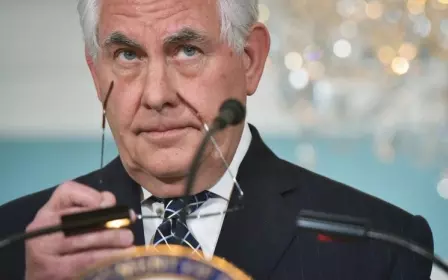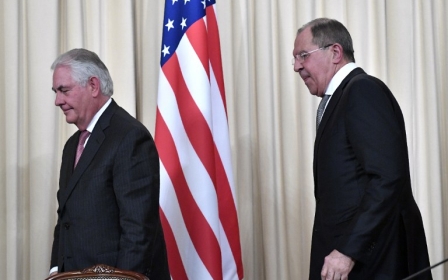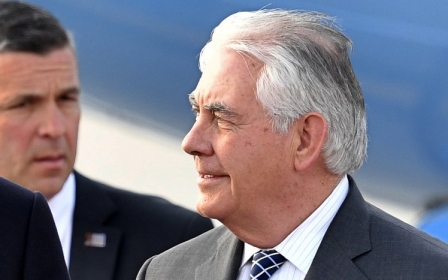US Secretary of State Rex Tillerson lays out diplomatic priorities

Secretary of State Rex Tillerson laid out his plans on Wednesday for tackling world issues, including how to tackle the Islamic State (IS) group and the standoff with North Korea, which he called the “most urgent challenge the United States has to deal with".
Three months after taking over the State Department, Washington's top diplomat gave a wide-ranging pep talk to his staff around the globe on the work ahead.
In his budget proposal, President Donald Trump has proposed slashing the US foreign relations and aid budget by more than a quarter.
But Tillerson reassured his audience that they would be consulted on plans to restructure the department even as they work together on key challenges.
Islamic State group
Before North Korea's latest weapons tests, Trump had made the battle to eradicate "radical Islamic terrorism the focus of his foreign policy”.
It remains a key goal, and Tillerson said the State Department would be part of the effort.
He described the threat as emanating in "concentric circles" from the battlefields of Iraq and Syria through the Middle East to Africa and Central Asia.
"So a lot of work ahead of us," he said, underlining that the battle is central to policy in the region.
"Many of you are directly engaged in it already. Many more of you are going to become engaged in it, I think you can expect."
Last month, Tillerson said the United States would set up "interim zones of stability" to help refugees return home in the next phase of the fight against the Islamic State (IS) group and al-Qaeda in Syria and Iraq.
"The United States will increase our pressure on ISIS and al-Qaeda and will work to establish interim zones of stability, through ceasefires, to allow refugees to return home," Tillerson said.
Russia
In his former job as CEO of energy giant ExxonMobil, Tillerson was a frequent visitor to Russia, pursuing oil deals with President Vladimir Putin's Kremlin.
Russia clearly hoped that Trump's election victory and Tillerson's appointment would lead to warmer ties with Washington - that has not happened.
Tillerson told his colleagues that, on a visit to Moscow last month, he had told Putin that relations are as bad as they have been since the Cold War.
"He did not disagree. He shrugged his shoulders and nodded in agreement," Tillerson said.
Washington hopes to work with Russia to develop ceasefire zones in Syria, but the former foes are still divided over Russia's intervention in Ukraine.
So the secretary, who meets Russia's Foreign Minister Sergei Lavrov in Alaska next week, said he would work on "some small things" to build a level of trust.
"So that's what we're hoping, is that we can begin to build a way in which we can learn how to work with one another. I don't know whether we can or not," he said.
North Korea
North Korea's efforts to develop an arsenal of nuclear-armed missiles capable of reaching US cities are the "greatest threat" faced by the United States.
Tillerson told the diplomats that he had advised Trump to "test" China's commitment to reining in its neighbour by "leaning in hard" on leader Xi Jinping.
If Beijing fails to enforce existing UN sanctions, he warned, then Washington could take action against Chinese banks or companies that deal with Pyongyang.
"So it's a pressure campaign that has a knob on it. I'd say we're at about dial setting 5 or 6 right now," he said, without saying how high the dial goes.
"I would say we're at about the 20 to 25 percent stage of this strategy... but we've got a lot of work left to do to keep that pressure on."
China
China's role in North Korea may be the most pressing issue, but Tillerson senses an opening to reset the basis of China-US ties for the next 50 years.
Trump and Xi, the leaders of the world's two biggest powers, met last month in Florida and Tillerson wants the bilateral dialogue to intensify.
Differences remain over freedom of navigation in waters claimed by China in the South China Sea and the trans-Pacific trade imbalance.
But Tillerson said ties were at a "point of inflection" and ripe for review.
"Let's kind of revisit this relationship, and what is it going to be over the next half century.
"I think it's a tremendous opportunity we have to define that, and there seems to be a great interest on the part of the Chinese leadership to do that as well."
The rest
Tillerson cited work in Africa to alleviate health crises and disrupt terror networks, and in Latin America to combat trafficking and extremist finance.
But his list of priorities included no reference to Europe, beyond repeating Trump's call for NATO members to spend more on collective defence.
New MEE newsletter: Jerusalem Dispatch
Sign up to get the latest insights and analysis on Israel-Palestine, alongside Turkey Unpacked and other MEE newsletters
Middle East Eye delivers independent and unrivalled coverage and analysis of the Middle East, North Africa and beyond. To learn more about republishing this content and the associated fees, please fill out this form. More about MEE can be found here.




